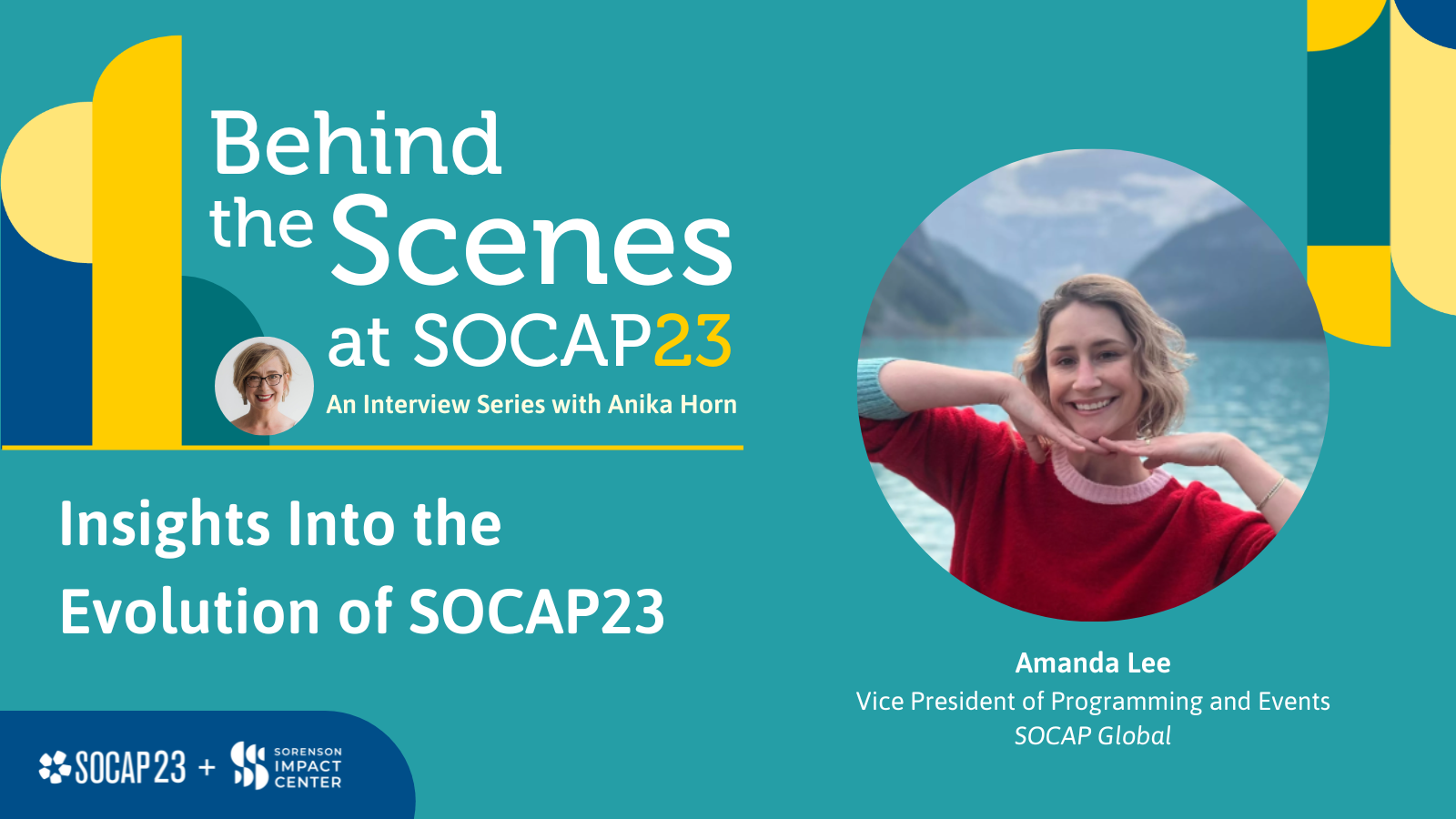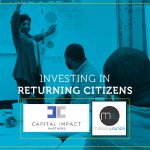This is the fifth installment of our SOCAP Behind the Scenes interview series. In this series, members of the SOCAP team openly share how they are approaching this year’s event, building on its legacy to meet the current needs of the impact community — and see around corners to the future of the global impact movement. Amanda Lee has been with SOCAP for the last six years and helped re-envision the organization after Sorenson Impact Institute assumed leadership of SOCAP Global in 2022. From programming during the COVID pandemic, turning the event virtual for two years, to recruiting the new leadership team and moving the global convening to a new space, Amanda has helped drive and lead the team in its collective vision for SOCAP23 — and beyond.
What opportunities are new at SOCAP this year that attendees can’t miss?
For attendees, I think the greatest impact will be noticeable in the three-day programming and the intentional facilitation of networking opportunities. For the first time this year, we convened Content Curation Councils to ensure we are addressing the most relevant and urgent issues of our times. We are introducing new content formats — such as delegate-led sessions and lightning talks — to create more space for two-way conversations and actual problem-solving. These formats will bring people together to have focused and productive conversations that can go deeper than when you’re listening to someone on a stage.
We are activating the entire Yerba Buena Center for the Arts and the Contemporary Jewish Museum to facilitate networking and deal-making. We are collaborating with musicians and artists, and the galleries in both spaces will be open to attendees throughout the event. We’re kicking off first thing Monday morning with an Opening Ceremony in the Yerba Buena Gardens that is co-hosted by Raven Indigenous Impact Fund, and we are closing the event on Wednesday night with a SOCAP Garden Party.
Since you began working with SOCAP, how has the conference evolved to meet attendees’ needs?
We have reinvented the entire event over the past two years with a lot of care and intention throughout every piece of SOCAP: the way we hire, the way we work with our team, and even with contractors who align with our impact mission (from cup provider to marketing team to caterer). All of this has changed the culture within the organization and our flagship event to best meet the needs of our attendees and community at large.
In 2020, when we were virtual for COVID, we had 245 sessions in 45-minute blocks. This year, we have 90 sessions in 90-minute blocks to allow attendees time to connect immediately after. It lessens the quantity of sessions but hopefully increases the quality. We are intentionally making the entire event less transactional and instead creating more space for genuine connections and conversations. Rather than running from one session to the next, we want to ensure attendees have time and space to continue the conversation and build meaningful relationships that lead to lasting solutions and impact.
For the first time, we’re using Brella’s event app to help attendees meet the right people. We also are hosting networking sessions led by creative facilitators throughout the week. Some people learn through listening, while others are visual learners, so we designed our spaces with the intention of accommodating different learning and processing styles.
Lastly, we succeeded in opening our doors wider than in prior years. Thanks to our collaboration with the Indigenous Access Fund, the Skoll Foundation, and the Global Travel Initiative, we were able to recruit more international speakers. On top of that, our Entrepreneurship Program is taking a more central role this year, making the overall event experience more global in nature.
What can attendees expect from the different locations at SOCAP this year?
The spaces where we host SOCAP are as unique as the attendees who attend and are central to San Francisco’s revitalization. We love showcasing progressive movements for the arts in our partnership with Yerba Buena Center for the Arts and other initiatives that are vital to the city’s revitalization efforts. The Contemporary Jewish Museum focuses on engaging a diverse audience and a new perspective on Jewish culture. And while Cityview might not be the most standout space at first glance, you won’t find another view of downtown quite like it. It will be home to the Partner Expo and Global Entrepreneurship Lounge, making it a really dynamic space for connection.
We worked hard to ensure the spaces create a welcoming environment for all attendees. We want to accommodate different needs and preferences so everyone can actively participate and connect but also take a minute away from the excitement if needed. For example, we’ll have arts and crafts areas in the Jewish Contemporary Museum, and attendees can go play chess in the Gardens.
What should attendees be sure not to miss at this year’s event that might not be obvious from the agenda?
Because we are convening for three full days, we start bright and early on Monday morning with an Opening Ceremony you won’t want to skip. That’s where we are setting the stage and tone for our entire three days together.
Personally, I think the closing party on Wednesday is a must-attend. What used to be a small parking lot affair with three food trucks and a band now takes over the entire YBCA Gardens with live music, 12 food trucks, and multiple regional wineries pouring glasses. It’s a great way to decompress from three days of content and focus on celebrating the connections made. This is our way of thanking everyone for being part of SOCAP.
Other interviews in the series:
• A New Approach to Event Content and Curation at SOCAP23
• The Lighthouse Effect: Partnering with SOCAP
• Facilitating Deal Flow: Evolving the SOCAP Entrepreneur Program





